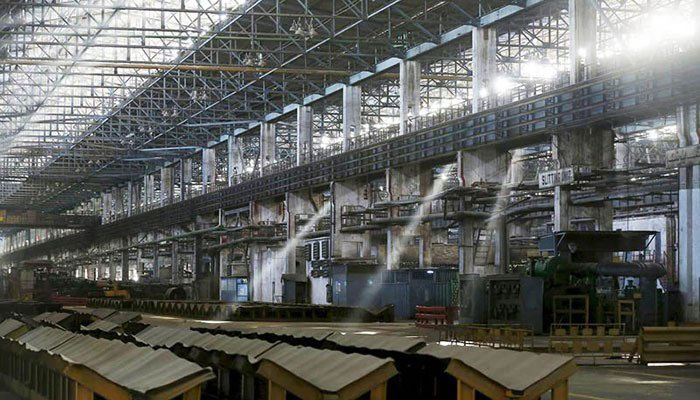Government eyes PSM revival post rightsizing
ISLAMABAD: The government is all set to start a revival plan for loss-making Pakistan Steel Mills (PSM) to reduce dependency on imports after retrenchment of the company’s employees, it was learnt on Saturday.
PSM revival is critical to reduce dependence on imports, increase steel production and save precious public funds. PSM is heavily overstaffed with over 9,300 employees and the government planned to conduct layoffs after paying Rs20 billion. The government planned to launch a privatization plan after retirement of employees, according to sources.
PSM remained in profit from 2000-01 to 2007-08 and had a profit of over Rs2.3 billion in 2007-08 on record sales of Rs42 billion and payables of only Rs7 billion. However, PSM’s mishandling has resulted in debts of over Rs230 billion whereas losses piled up to over Rs160 billion. Successive governments have spent more than Rs90 billion in different bailout packages for PSM. PSM monthly bill in salaries and retirement dues is over Rs750 million. In addition, thousands of acres of precious lands are lying unutilised as PSM has not undergone any expansion.
Steel’s demand, production and sales have a strong bearing on health of a national economy.
Pakistan domestic production has slipped from a recent high of 7 million tons. There are signs of recovery as tax collection from domestic steel production is growing strongly.
Minister for Industries and Production told this scribe that production is not down by more than half and tax collection has grown significantly.
Due to low development activity, Pakistan consumes less than one percent of global crude steel production of nearly 1,869 million tons in 2019 which is a very low figure for sixth most populous nation on earth. PSM could never increase beyond one million tons of capacity whereas other mills which launched at same time have crossed 10 million tons output and some even higher.
PSM is based on old blast furnace technology and its modernisation, increase in output capacity to minimum 3 million tons per annum and reducing the workforce to required level are needed to make it viable.
This is only likely through a total revamp of PSM and introduction of genuine new investors after clearing existing hurdles.
Senator Raza Rabbani issued statement against the plan to revive PSM. There is a dire need of a bipartisan consensus on state-owned enterprises’ (SOEs) revival and genuine concerns of opposition should be addressed.
Due to dismal state of state owned enterprises, there is undue burden of non-productive manpower and assets on treasury.
Chinese SOEs are so well managed, that they are equal to size of world’s number fifth economy. Pakistan’s SOEs revival is only possible with involvement of genuine investors, quality nominations on board of directors by government and efficient management and business practices.
Pakistan meets nearly one third of its steel demands of 7-9 million tons through imports. The closure of Pakistan Steel Mills for last 5 years has increased Pakistan dependence on imports besides burning over Rs50 billion on a non-productive entity. Pakistan has one of lowest per capita consumption in Asia, which is less than half of even Indian per capita steel consumption of 75 kg. The Asian per capita steel consumption on average is over 275 kilograms and the global average is over 225 kilograms.
The sale of steel products world over was over $2.5 trillion and an additional $500 billion are generated through value addition. An additional $1.2 trillion is generated through impact of steel on supply chain of other industries.
-
 Lewis Capaldi Sends Taylor Swift Sweet Message After 'Opalite' Video Role
Lewis Capaldi Sends Taylor Swift Sweet Message After 'Opalite' Video Role -
 Sarah Ferguson Joins Andrew In ‘forcing’ Their Daughters Hand: ‘She Can Lose Everything’
Sarah Ferguson Joins Andrew In ‘forcing’ Their Daughters Hand: ‘She Can Lose Everything’ -
 'Bridgerton' Author Reveals If Actors Will Be Recast In Future Seasons
'Bridgerton' Author Reveals If Actors Will Be Recast In Future Seasons -
 50 Cent Super Bowl Ad Goes Viral
50 Cent Super Bowl Ad Goes Viral -
 'The Housemaid' Lifts Company's Profits: Here's How
'The Housemaid' Lifts Company's Profits: Here's How -
 Michael Douglas Recalls Director's Harsh Words Over 'Wall Street' Performance
Michael Douglas Recalls Director's Harsh Words Over 'Wall Street' Performance -
 Henry Czerny On Steve Martin Created Humor On 'Pink Panther' Set
Henry Czerny On Steve Martin Created Humor On 'Pink Panther' Set -
 Lady Victoria Hervey: Andrew Mountbatten-Windsor's Ex-girlfriend Proud Of Being On Epstein Files
Lady Victoria Hervey: Andrew Mountbatten-Windsor's Ex-girlfriend Proud Of Being On Epstein Files -
 Huawei Could Revive Chip Technology If US Lets Guard Down, Intel CEO Says
Huawei Could Revive Chip Technology If US Lets Guard Down, Intel CEO Says -
 Dolly Parton Created One Of Her Iconic Tracks With Acrylic Nails?
Dolly Parton Created One Of Her Iconic Tracks With Acrylic Nails? -
 Parents Alarmed As Teens Form Emotional Bonds With AI Companion Chatbots
Parents Alarmed As Teens Form Emotional Bonds With AI Companion Chatbots -
 Denzel Washington Surprises LeBron James
Denzel Washington Surprises LeBron James -
 Cillian Murphy's Hit Romantic Drama Exits Prime Video: Here's Why
Cillian Murphy's Hit Romantic Drama Exits Prime Video: Here's Why -
 Paris Hilton Reveals What Keeps Her Going In Crazy Schedule
Paris Hilton Reveals What Keeps Her Going In Crazy Schedule -
 Deep Freeze Returning To Northeastern United States This Weekend: 'Dangerous Conditions'
Deep Freeze Returning To Northeastern United States This Weekend: 'Dangerous Conditions' -
 Inside Dylan Efron's First 'awful' Date With Girlfriend Courtney King
Inside Dylan Efron's First 'awful' Date With Girlfriend Courtney King




